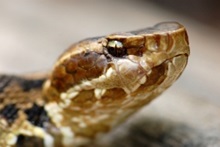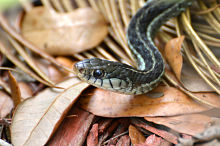Most snakes are non-venomous and not aggressive unless threatened. There are 37 species of snakes found in North Carolina, but five venomous snakes cause the majority of snake bite poisonings.
 |
 |
|
Venomous Snake Characteristics triangular or diamond-shaped head |
Non-venomous snake characteristics smooth, tapered head |
Venomous snakes leave one or two puncture wounds.
If bitten by a snake, you SHOULD:
If bitten by a snake, you SHOULD NOT:
If a snakebite victim is having chest pain, difficulty breathing, face swelling, or has lost consciousness, call 911 immediately.
Call NC Poison Control at 1-800-222-1222 or chat from this site for questions about a snake bite or for more information.